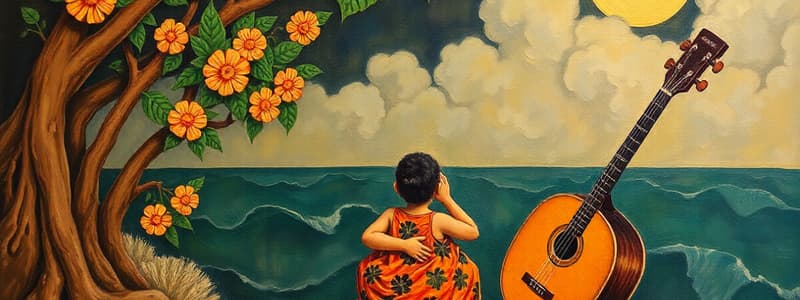Podcast
Questions and Answers
Philippine literature is associated with the __________ from prehistory to the present.
Philippine literature is associated with the __________ from prehistory to the present.
Philippines
The art form of __________ combines words to create meaning and experience.
The art form of __________ combines words to create meaning and experience.
literature
The Philippine __________ has evolved into an amalgamation of different influences after the Japanese occupation.
The Philippine __________ has evolved into an amalgamation of different influences after the Japanese occupation.
theatre
Folk dances in the Philippines include Tinikling, Pandanggo, Cariñosa, and __________.
Folk dances in the Philippines include Tinikling, Pandanggo, Cariñosa, and __________.
Signup and view all the answers
Contemporary art is defined as art made by artists __________ today.
Contemporary art is defined as art made by artists __________ today.
Signup and view all the answers
The expression or application of human creative skill and imagination is known as ______.
The expression or application of human creative skill and imagination is known as ______.
Signup and view all the answers
A three-dimensional artwork that can be made from stone, marble, wood, or concrete is called a ______.
A three-dimensional artwork that can be made from stone, marble, wood, or concrete is called a ______.
Signup and view all the answers
The art form that blends European, American, and native sounds in the Philippines is known as ______.
The art form that blends European, American, and native sounds in the Philippines is known as ______.
Signup and view all the answers
Structures designed to provide shelter and incorporate artistic elements are part of ______.
Structures designed to provide shelter and incorporate artistic elements are part of ______.
Signup and view all the answers
The painter or artist can use materials like charcoal, ink, and oil paint for ______.
The painter or artist can use materials like charcoal, ink, and oil paint for ______.
Signup and view all the answers
Study Notes
Philippine Art Overview
- Art is the expression of human creativity, often visual, encompassing forms like painting and sculpture.
- Aristotle suggested that human beings have innate instincts for imitation, underpinning the human nature of art.
Forms of Philippine Art
- Visual Art: Includes drawing, painting, printmaking, and photography, utilizing mediums like chalk, charcoal, and oil paint to create two-dimensional images.
- Sculpture: A three-dimensional art form crafted from materials such as stone, marble, and wood, often intended for decoration or as gallery pieces.
- Architecture: The design and construction of shelters combining functionality and artistic elements; showcases a mix of traditional huts and modern structures in the Philippines.
- Music: Combines indigenous, European, and American influences; Original Pilipino Music (OPM) emerged as a distinct genre post-1970s Manila Sound.
- Literature: Encompasses works from prehistory through colonial periods to modernity, with oral traditions and notable works like "Noli Me Tangere."
- Theater: A performative art evolving from colonial influences; includes styles such as zarzuela and bodabil.
- Cinema: Merges theater with technological advancements, exploring human experiences through independent films and digital productions.
- Dance: Involves physical expression through choreography; features traditional folk dances like Tinikling and Cariñosa.
Characteristics of Philippine Art
- Art evolves with societal context, production methods, and promotion.
- Reflects historical events and societal conditions while symbolizing people's emotions and perceptions.
Contemporary Art
- Defined as art made by living artists who engage with culturally diverse and technologically advancing environments.
- Characterized by new elements:
- Appropriation: Using existing objects or images with minimal alteration to provoke thought and dialogue on historical contexts.
- Performance: Explores human activity with emphasis on spontaneity and social influence on interpretation.
- Space: Refers to the context of art's physical and conceptual environment, shaping its interpretation.
- Hybridity: The blend of diverse materials and ideas, symbolizing dualism and complexity within artistic expression.
- Technology: Incorporates digital tools for creation, distribution, and engagement, enhancing artistic reach and addressing logistical challenges.
Importance of Contemporary Art
- Continues the evolution of artistic thought reflective of present-day experiences and innovations.
- Encourages discourse on identity, tradition, and modern contexts within the Philippine art landscape.
Studying That Suits You
Use AI to generate personalized quizzes and flashcards to suit your learning preferences.
Related Documents
Description
Explore the diverse landscape of Philippine art, including its various forms such as visual arts, sculpture, architecture, music, and literature. Understand how these artistic expressions reflect the rich cultural influences and creativity inherent in the Philippines.




